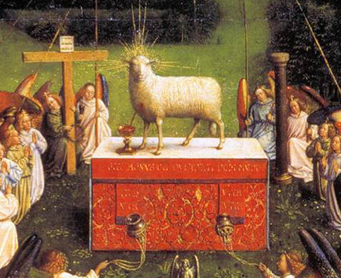
 EA CULPA, mea culpa, mea maxima culpa… Those that want to find meaning to their existence should always recognize that we are in the condition of sinners. As I said previously, I am not really into this mindset of seeing everything as joyful, playful and full of spiritual laughter. And not because I dislike joy, not at all: but because I need to be honest with myself and recognize the reality of what surrounds me.
EA CULPA, mea culpa, mea maxima culpa… Those that want to find meaning to their existence should always recognize that we are in the condition of sinners. As I said previously, I am not really into this mindset of seeing everything as joyful, playful and full of spiritual laughter. And not because I dislike joy, not at all: but because I need to be honest with myself and recognize the reality of what surrounds me.
This misleading conception is never more true than in some of our modern Masses, where the joy is compulsory even during Good Friday, that is just borne because in a few days it will be Easter. But because we are redeemed through the Passion of Jesus, our sinful condition so became “felix culpa.” When I am in these liturgies full of clapping, jumping and going hand in hand, I feel that there is a betrayal of the nature of the liturgy itself. Some justify this with the fear of losing youth. But are you gaining them when you are immersing them in a lie?
Life is not a piece of cake. And the Mass is not a Sunday recreational moment. We need to feel the burning of being close to God. If we cannot be good, at least let us be honest. If we are close to God we know we should accept being part of His Passion. This is life, also at the deepest spiritual level. Divo Barsotti,1 a great Italian Christian thinker says it very well in his book Fissi gli occhi nel sole (The eyes fixed on the sun): “Some images defend the truth more than many abstract concepts. So the image of fire. God is Fire. You are not living a contact with Him without burning” (pg. 83, my translation). If we don’t accept this dimension in trying to be good, we are only being dishonest. The same Barsotti continues:
The man here on earth hides himself, defends himself against Fire, but if he really offers himself naked to the Fire, then his life will be no more that being invested from Fire, it is no more than burning. When will you be pure flame? So the image of piety. Your sin is hardening you and you want to be broken, destroyed. You say to God – your prayer is only one -: Break me, smash me, destroy me, O God (pg. 83, my translation).
BUT THE DIMENSION PRESENTED by the great Father Barsotti is not the one we are living in our Masses, where we need to appear as what we are not. Indeed the so called artists, are those that most willingly offer themselves naked to the fire. And this makes them look ridiculous to the eyes of other men, as said very well from Charles Baudelaire, in his poem about the Albatross, this animal that was the laughingstock of the common man because of appearing so awkward. And he compares this bird to the artist, the poet:
Le Poète est sembable au prince des nuées
Qui hante la tempête et se rit de l’archer;
Exilé sur le sol au milieu des huées,
Ses ailes de géant l’empêchement de marcher.
“The Poet is like the prince of the clouds,
Haunting the tempest and laughing at the archer;
Exiled on earth amongst the shouting people,
His giant’s wings hinder him from walking”(Translated by Geoffrey Wagner, 1974).
But everyone knows that people still like to judge as ridiculous what in reality just threatened the emptiness of their own existence.
BOTTEGA • Aurelio Porfiri is where you can discover
many of Mæstro Porfiri’s compositions in PDF format.

NOTES FROM THIS ARTICLE:
1 To learn more about Fr. Divo Barsotti, please see my previous article.
